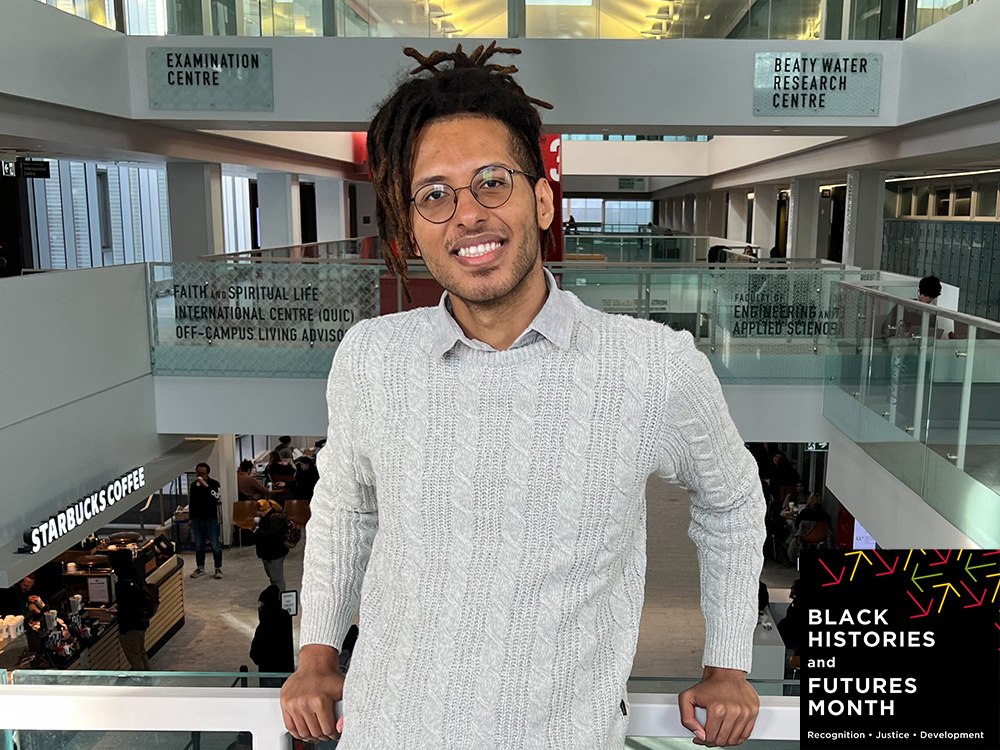Stephen Obadinma, a PhD candidate in Electrical and Computer Engineering, is delighted to have been named the recipient of this year’s Indigenous and Black Engineering and Technology (IBET) Momentum Fellowship, an award that goes to an Indigenous or Black student pursuing a doctoral degree in engineering.
“The Black element is important,” he says of the recognition. “I got to Queen’s and saw a lot of fellow students and researchers, but there was not a lot of Black representation. To be recognized for that, it shows that Queen’s is encouraging more Black people to become researchers. Oftentimes it really seems that there are not a whole lot of us trying to pursue research.”
Obadinma was just six years old when he arrived in Canada from Nigeria. His father, a university lecturer with a PhD in metallurgical and materials engineering, moved the family to Ontario in hopes of finding a faculty position in his field. Instead, he struggled. He did not hold a degree from a North American university, and he was Black, so inevitably he found himself marked an outsider. His son quickly understood that it could be difficult for Black people and for people from developing nations to find opportunities for professional advancement in Canada.
The IBET Fellowship was created by a partnership of Faculties of Engineering at six Ontario universities, including Queen’s, in 2021 and has now expanded to 15 universities across Canada. It awards recipients with $30,000 per year in funding, for four years. The fellowship is also designed to foster a supportive academic community for scholars from groups typically underrepresented in engineering.
Upon learning he had won the award, Obadinma, who started his PhD in September 2022, went out and bought himself an expensive GPU to use with the computer he built himself to facilitate his research in Artificial Intelligence. Obadinma studies machine learning models with a focus on robustness and calibration, or the ways in which those models make predictions that are not only accurate but also ones that can be trusted. His doctoral research is going to focus on finding the best way to incorporate external knowledge into large language models, and studying how to make them more robust, particularly against misinformation and “adversarial attacks,” which specifically means trying to make models better at not being tricked by digital “noise” added to inputs.
“We give the model a sentence, and an algorithm generates noise in that sentence, like in the form of typos, which might be insignificant to humans. Normally, a model will look at that noise and classify the meaning of the sentence incorrectly because of it,” Obadinma explains. “We can teach it to overcome that noise.”
Obadinma had not always imagined following an academic path. It was after the third year of his undergraduate degree in computer engineering at Queen’s that he learned of an NSERC-funded program, the undergraduate student research awards, which would enable him to pursue research as a summer job. After landing the award, he connected with Xiaodan Zhu, an Associate Professor of Electrical and Computer Engineering, who agreed to supervise him. Zhu saw an aptitude for research in Obadinma, and suggested he consider continuing to a master’s degree under his supervision.
With that degree in hand, Obadinma’s father encouraged him to consider doctoral work. “Originally, I just wanted to do the master’s degree and move on,” he laughs. “And he was the one who was goading me into the PhD.”
Obadinma, who is still working with Dr. Zhu, has not yet decided whether he will stay on an academic path upon graduation or whether he will move into industry instead. For now, he is delighted to have the IBET PhD Project’s support. Not having had a single Black teacher throughout his own education, from elementary school through university, Obadinma knows that he is in a position to make a difference in the world of engineering, no matter what he chooses.
“My dad always wanted me to go down this path and to try to show that it’s possible to succeed as a Black academic in Canada,” he says. “It was pretty cool to get this support and I am grateful for this opportunity presented to me.”
